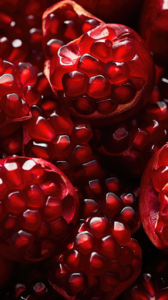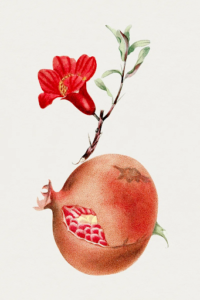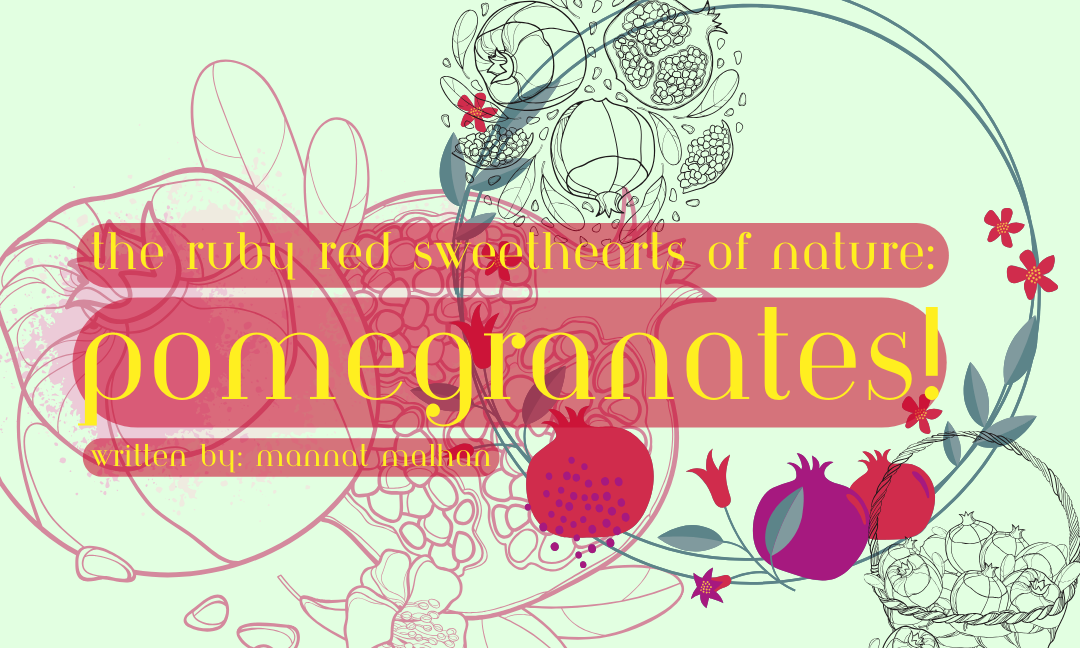Written by: Mannat Malhan
Edited by: Nehaa Kousihan
Designed by: Tvisha Lakhani
Published by: Maryam Khan
Let’s picture this: You’re strolling into a bustling farmers’ market and you see them – those vibrant, red orbs that just catch your eye. That’s right, we’re talking about the sweet pomegranates, nature’s treasure of flavour and nutrition. 
First thing, let’s unravel the mystery (or fact) of why these fruits are so great for food systems. Pomegranates are like the cool kids of agriculture. They thrive in multiple climates, from California to the Mediterranean, and are an excellent addition to seasonal recipes. Plus they aren’t picky at all – you only need a small amount of pesticides and water for these fruits to grow. Their adaptability makes them amazing for local agriculture, helping farmers across many regions. The hardiness of pomegranate trees means that they can endure tons of harsh environmental conditions. Pomegranates’ such nature makes them contributors to a resilient food system.
Now, let’s think about the journey of a pomegranate from the orchard to the table. It’s not just a fruit; it’s a tiny but strong hero in supporting local farms and sustainable practices that help the environment. By choosing to eat pomegranates, you’re basically rooting for food systems that are good for the local communities and the planet.
To keep it going, the true magic of pomegranates sits in their nutritional values. They’re heroes, of course, they wear a cape of antioxidants. The small seeds, also known as arils, are filled with polyphenols, which are elegant compounds that do wonders for our bodies. These fight off oxidative stress and inflammation. So, it’s great for our skin and mind too!
 The arils (the shiny, juicy things) are a rich source of dietary fibre. Fibre is the nutrient of good heart health and digestion. It keeps things in your body moving smoothly and helps lower cholesterol levels. And let’s not get started on all the Vitamin C! Pomegranates are filled to the brim with it. Vitamin C protects our immune system, keeping you safe from infectious diseases.
The arils (the shiny, juicy things) are a rich source of dietary fibre. Fibre is the nutrient of good heart health and digestion. It keeps things in your body moving smoothly and helps lower cholesterol levels. And let’s not get started on all the Vitamin C! Pomegranates are filled to the brim with it. Vitamin C protects our immune system, keeping you safe from infectious diseases.
But that isn’t the best part. Pomegranates aren’t just for snacking. You can throw them into a salad for a tangy kick, blend them into smoothies, or make them into a syrup for your desserts! The possibilities are just as endless as the health benefits.
Did you know? In Greek Mythology, the fruit is linked to Persephone, the daughter of Demeter (goddess of agriculture). She was abducted by Hades to the Underworld. Apparently, the pomegranate seeds were the things that bound her to Hades. As a result, this myth is used to explain the changing seasons. When Persephone is with Demeter, it’s summer and when she’s with Hades, it’s winter.
It’s also said that the goddess of love and beauty, Aphrodite, was the one who planted the first pomegranate tree, which is why they’re commonly known as “the fruits of love”. These jewels are also sacred to Hera, the goddess of childbirth, so in some cultures, the fruit represents fertility and abundance.
So through this journey, we’ve learned that these red jewels of freshness don’t only support sustainable food systems in the face of adversities, but they also offer many health benefits. They’re nature’s way of really saying, “Here’s a fruit that gives to the planet and you too.”
Maybe next time you carefully take out the sweet arils of the fruit, savour all the flavour and the fact that you’re part of a resilient and delish cycle that helps us all. Happy munching to you this Valentine’s Day!
Works Cited
“Pomegranate | Description, Cultivation, & Facts | Britannica.” Encyclopædia Britannica, 2019, www.britannica.com/plant/pomegranate.
“5 Things You Didn’t Know about Pomegranates | Kew.” Www.kew.org, www.kew.org/read-and-watch/surprising-pomegranate-facts#:~:text=Symbol%20of%20death%20and%20fertility&text=It%20also%20prominently%20featured%20in. Accessed 30 Dec. 2023.
Leech, Joe. “12 Health Benefits of Pomegranate.” Healthline Media, 15 Aug. 2018, www.healthline.com/nutrition/12-proven-benefits-of-pomegranate.
“Plant Science at Your Dinner Table: Pomegranates.” 4-H Plants, Soils & Gardening, www.canr.msu.edu/news/plant-science-at-your-dinner-table-pomegranates. 1 June 2022.
University, Utah State. “Pomegranate, Fruit of the Desert.” Extension.usu.edu, extension.usu.edu/yardandgarden/research/pomegranate-fruit-of-the-desert.
Mayo Clinic. “Dietary Fiber: Essential for a Healthy Diet.” Mayo Clinic, 4 Nov. 2022, www.mayoclinic.org/healthy-lifestyle/nutrition-and-healthy-eating/in-depth/fiber/art-20043983.
Cartwright, Mark. “Aphrodite.” World History Encyclopedia, 24 Oct. 2018, www.worldhistory.org/Aphrodite/.
Greek Myths & Greek Mythology. “Myth of Hades and Persephone.” Greek Myths & Greek Mythology, 16 Nov. 2010, www.greekmyths-greekmythology.com/myth-of-hades-and-persephone/.
“Pomegranate Seeds: Benefits and Tips.” Www.medicalnewstoday.com, 12 July 2017, www.medicalnewstoday.com/articles/318384.
“Ruby Gems, Pomegranate Arils, Displaying an Intricate Pattern.” Pixexid.com, pixexid.com/image/ruby-gems-pomegranate-arils-displaying-an-intricate-pattern-mhsbbcme.

